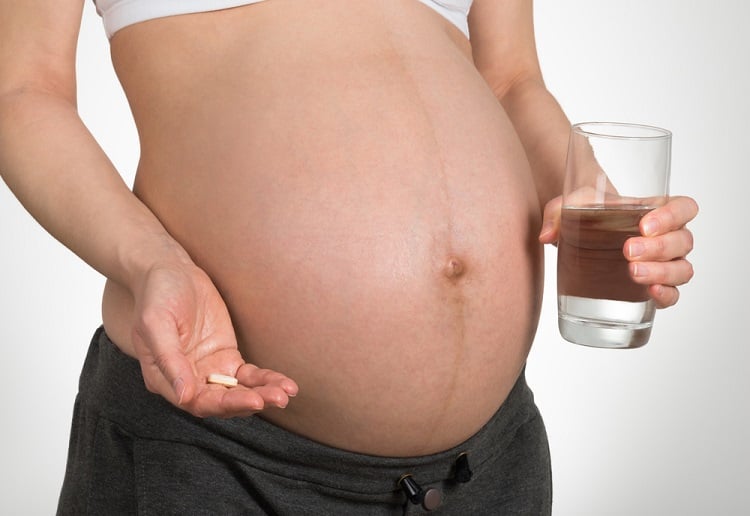Pregnant women who take paracetamol are more likely to have children with behavioural problems, new research suggests.
Scientists have found an association between mothers who took the drug in the first and third trimester of pregnancy and hyperactivity and emotional problems in their seven-year-old children.
However pregnant women have been told there is no need to panic – they should continue to take the lowest dose needed for the shortest time possible and see their doctor if they have any concerns.
In the latest research, carried out by the University of Bristol, scientists analysed records of 7,796 mothers who gave birth between 1991 and 1992 in the UK, reports Daily Mail.
The women had been asked at 18 weeks and 32 weeks of pregnancy whether they had taken any paracetamol.
They and their partners were asked again about their paracetamol use when the child was 61 months old. Children were then tested at seven years old to see if they had any emotional or behavioural problems.
Just over half of mothers had used the painkiller at 18 weeks, with 42 per cent using it at 32 weeks. Following birth, 84 per cent of mothers and their partners used it.
Around 5 per cent of the children studied had behavioural problems.
The results showed a link between use of the drug at 18 weeks with increased risk of conduct problems and hyperactivity symptoms in children, while taking paracetamol at 32 weeks was linked with emotional symptoms and overall difficulties.
There was no association between the amount of paracetamol taken by mothers and their partners after the birth with behavioural problems, which researchers said showed the children’s problems could not be explained by other social factors linked to paracetamol use.
Researchers suggested that paracetamol could affect a mechanism in the womb which affected brain development.
Author Dr Evie Stergiakouli said the extent of the results was ‘surprising’.
She added: ‘We found that maternal prenatal (paracetamol) use at 18 weeks was associated with higher odds of the offspring having conduct problems as well as hyperactivity symptoms.
‘(Paracetamol) use at 32 weeks was associated with higher odds of emotional symptoms, hyperactivity, as well as total difficulties.’
The study found the link between taking paracetamol and multiple behavioural and emotional problems was strongest when mothers took it in the third trimester of pregnancy.
The authors wrote: ‘Given that there is active brain development and growth during the third trimester, this finding could indicate that there are developmental periods when the brain is more sensitive to (paracetamol) exposure.’
They added: ‘Given the widespread use of (paracetamol) among pregnant women, this can have important implications on public health advice. However, the risk of not treating fever or pain during pregnancy should be carefully weighed against any potential harm to the offspring.’
Dr Tim Overton, of the Royal College of Obstetricians and Gynaecologists, said: ‘It is important to highlight that from these results we cannot determine a direct link between paracetamol usage and any behavioural problems.
‘Paracetamol is one of the most common medicines used to reduce a high temperature and ease pain; it is safe and is used routinely during all stages of pregnancy.
‘Women should not be alarmed by the results of this study and we recommend that pregnant women continue to follow current guidance.’
He added that if the recommended dose of paracetamol did not control pain or fever, women should seek advice from their midwife, GP or obstetrician.
The Proprietary Association of Great Britain, which represents over-the-counter medicine manufacturers, said: ‘The results of this study should not alarm expectant parents as more research is needed in this area. The authors have also highlighted the potential risk of not treating fever or pain during pregnancy, over any potential harm that prenatal paracetamol use may cause to their offspring.’
Professor Ieuan Hughes, of the University of Cambridge, added that paracetamol was considered ‘safe’ in pregnancy and more research was needed before any public health decisions were made.
Dr Luke Grzeskowiak, a specialist pharmacist and researcher at the Robinson Institute and University of Adelaide, told SMH while the study was interesting, it was not strong enough for pregnant women to stop using paracetamol if they needed it to relieve pain or fever.
“We’re talking about an extra one to two cases [of behavioural problems] per 100 births being linked to paracetamol use,” he said.
“So in this study, 95 per cent of mums who took paracetamol during pregnancy had a child with no problems at seven years of age … I think that message gets lost in a lot of this.”
Dr Grzeskowiak told SMH paracetamol was still the first choice of painkiller for pregnant women because others, such as anti-inflammatory drugs like ibuprofen (the active ingredient in Nurofen) had been linked to an increased risk of miscarriage during early pregnancy, and harm to the fetus’ kidneys and heart later in pregnancy.
“The key message from this study is only to take paracetamol when absolutely necessary and to take it for the shortest possible duration, not to avoid it completely,” he said.
HEALTH risks to be aware of when taking paracetamol during pregnancy
Research also suggests that pregnant women who take paracetamol may be putting their baby at risk of developing childhood asthma.
While another study suggests taking paracetamol while pregnant is possibly linked to autism and hyperactivity in children.
Can I take paracetamol if I’m pregnant?
Health Direct recommend Paracetamol is considered the first choice of painkiller if you are pregnant as it has been taken my large numbers of pregnant women without any adverse effect on the mother or baby.
However, if you take paracetamol when pregnant, make sure you take it for the shortest possible time.
Can I take paracetamol if I’m breastfeeding?
Health Direct recommend Paracetamol is the first choice of painkiller if you are breastfeeding.
It appears in breast milk in very small amounts which are unlikely to harm your baby.
If you take paracetamol when breastfeeding, make sure you take it for the shortest possible time.
Share your comments below.




















-

-
-
meedee said
- 24 Aug 2021
-

-
-
Nas01 said
- 02 Oct 2016
-

-
-
mom94125 said
- 05 Sep 2016
-

-
-
mom101628 said
- 17 Aug 2016
-

-
-
rovermum said
- 17 Aug 2016
-

-
-
ella12 said
- 17 Aug 2016
-

-
-
tessie said
- 17 Aug 2016
-

-
-
mom172741 said
- 17 Aug 2016
-

-
-
mom134803 said
- 17 Aug 2016

-

-
-
mum4107 said
- 17 Aug 2016
-

-
-
mom81879 said
- 16 Aug 2016
-

-
-
BellaB said
- 16 Aug 2016
-

-
-
june11 said
- 16 Aug 2016
-

-
-
mom90758 said
- 16 Aug 2016
-

-
-
mom160421 said
- 16 Aug 2016
Post a comment11:18 am
7:50 pm
6:51 pm
3:27 pm
11:35 am
9:48 am
9:33 am
8:35 am
7:26 am
5:37 am
8:24 pm
6:15 pm
5:19 pm
5:17 pm
11:34 am
To post a review/comment please join us or login so we can allocate your points.